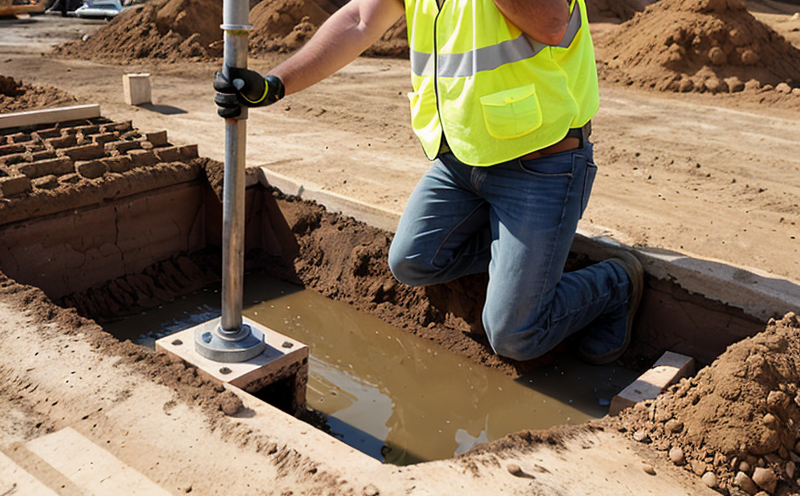Geotechnical & Foundation Testing
In the realm of building and infrastructure testing, geotechnical and foundation testing plays a crucial role in ensuring structural integrity and safety. This service involves the evaluation of soil properties, rock formations, and groundwater levels to provide critical data for the design and construction phases of infrastructure projects.
Geotechnical engineers use this information to recommend suitable materials, designs, and practices that can withstand environmental pressures and long-term usage demands. The primary goal is to identify potential risks early in the project lifecycle, thereby reducing costs associated with post-construction issues.
The process begins with site investigation, which includes soil sampling, drilling boreholes, and geophysical surveys. These activities generate detailed data about subsurface conditions that are essential for accurate design calculations. Once collected, this information is analyzed using advanced analytical tools to interpret the findings accurately.
Foundation testing specifically targets the assessment of bearing capacity, settlement potential, and stability of proposed structures. This requires precise measurement techniques such as load tests on piles or other structural elements. Load tests help determine how much weight a particular foundation can safely support without compromising its integrity.
The success of geotechnical and foundation testing relies heavily on state-of-the-art equipment and methodologies. Instruments like penetrometers, penetrometer indices, and cone penetrometers are frequently employed to measure penetration resistance and frictional forces within the soil layers. Additionally, piezometers may be installed to monitor groundwater levels accurately.
Acceptance criteria for these tests vary depending on local regulations and project specifications but generally adhere to international standards such as ASTM D2435 or ISO 14688. Compliance with these guidelines ensures uniformity across different projects and regions, promoting best practices in the industry.
The importance of geotechnical and foundation testing cannot be overstated when considering large-scale construction endeavors like skyscrapers, bridges, dams, highways, etc. By leveraging this expertise early on in the planning stages, developers can anticipate challenges before they become insurmountable obstacles later down the line.
For instance, a recent project involving the construction of an elevated highway required extensive geotechnical investigations due to its proximity to fault lines and unstable terrain. The team utilized sophisticated technologies like ground-penetrating radar (GPR) to map out subsurface structures in detail. This approach allowed them to identify weak points early on and devise mitigation strategies accordingly.
In another case study, a client faced challenges related to excessive settlement of their newly built office complex. Upon conducting comprehensive geotechnical tests, it was discovered that the area had higher-than-expected compressibility due to clayey soils beneath the building site. Armed with this knowledge, engineers adjusted the foundation design to incorporate deeper piles and denser grouting procedures, resulting in significantly reduced settlement rates.
These examples underscore why thorough geotechnical evaluations are indispensable for any significant construction venture. They offer invaluable insights into soil characteristics that could otherwise lead to costly delays or structural failures if overlooked during planning phases.
| Project Type | Testing Methodology | Objective |
|---|---|---|
| High-Rise Building | Borehole Sampling and Load Tests | Evaluate bearing capacity and identify potential weak zones. |
| Roadway Expansion | Cone Penetrometer Test (CPT) | Assess subgrade conditions and determine appropriate treatment. |
| Dam Construction | In-situ Compaction Testing | Ensure proper compaction of embankments and reduce seepage risks. |
| Tunnel Excavation | Seismic Profiling | Determine geotechnical stability along planned tunnel routes. |
Customer Impact and Satisfaction
The impact of reliable geotechnical and foundation testing extends beyond mere compliance; it significantly enhances customer satisfaction by ensuring robust structures capable of withstanding natural forces. Clients who invest in thorough geotechnical evaluations benefit from reduced risk profiles, enhanced project timelines, and lower lifecycle costs.
By partnering with trusted laboratories like ours, customers gain access to experienced professionals equipped with cutting-edge technology. Our team works closely with clients throughout the testing process, offering valuable insights and recommendations based on our findings. This collaborative approach fosters a stronger relationship built upon mutual trust and understanding.
We understand that every project has unique requirements, which is why we tailor each testing regimen to meet specific needs. Whether it's identifying optimal locations for foundation placement or determining appropriate reinforcement strategies, our goal remains consistent: deliver actionable intelligence that drives informed decision-making.
Moreover, adherence to strict quality control measures ensures consistent accuracy and reliability of results. Our commitment to excellence has earned us a reputation as one of the leading providers in this field. Many clients return to us time after time because they know we will consistently deliver high-quality services that exceed expectations.
Competitive Advantage and Market Impact
In today's competitive market, staying ahead requires more than just technical proficiency; it involves strategic foresight and innovative approaches. For companies involved in building and infrastructure projects, leveraging advanced geotechnical testing can provide significant advantages:
Early Risk Identification: By conducting comprehensive soil assessments upfront, potential issues are identified early on, allowing for proactive mitigation measures to be implemented promptly.
Cost Efficiency: Avoiding costly remediation efforts later in the project lifecycle translates directly into savings. This not only reduces overall expenses but also speeds up completion timelines.
Innovation Drive: Staying abreast of new technologies and methodologies allows firms to incorporate these innovations into their processes, giving them a competitive edge over competitors who lag behind.
Reputation Building: Consistently delivering superior services builds a strong reputation among clients. This leads to increased business opportunities and long-term partnerships.





